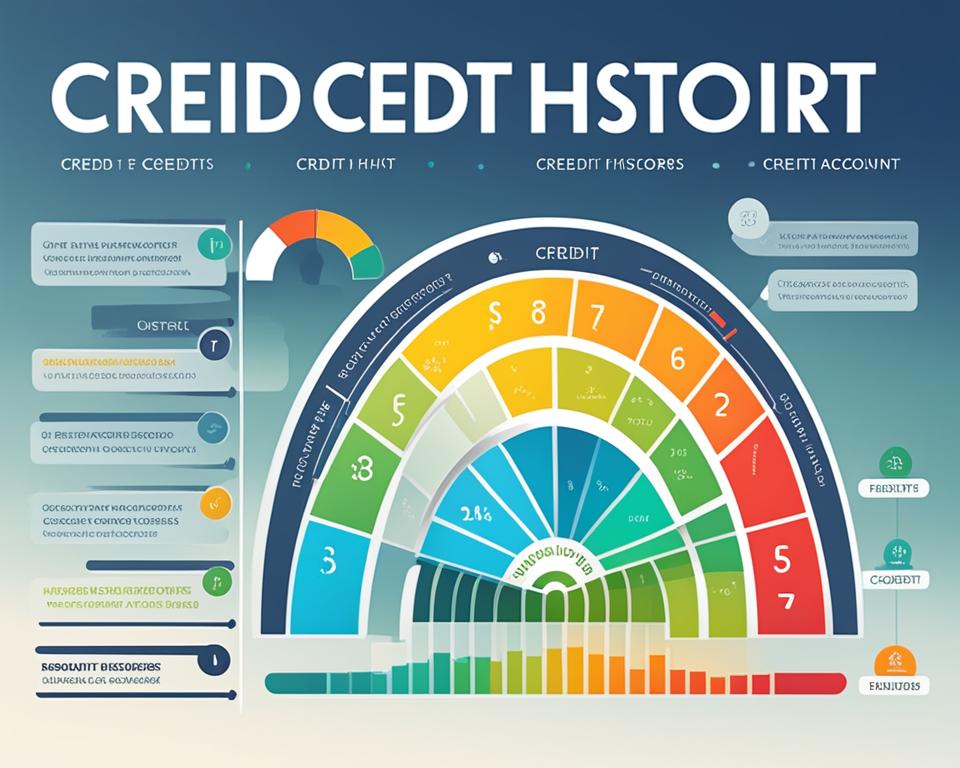Credit scores play a crucial role in our financial lives, impacting various aspects such as loan eligibility, interest rates, insurance premiums, rental applications, and even cell phone plans. It is essential to comprehend why credit scores are important and how they can significantly influence our financial opportunities.
Key Takeaways:
- A good credit score can lead to cost savings over time by securing lower interest rates on mortgages and auto loans.
- Understanding your credit score is vital for managing your financial health and taking advantage of financial opportunities.
- Credit scores can be obtained for free from credit card issuers, banks, or financial websites.
- Monitoring your credit score regularly and being aware of how it is calculated is essential.
- Building credit without debt is possible through credit-builder loans and secured credit cards.
The Importance of Credit Scores
H3: Unlocking a World of Financial Opportunities
A good credit score is more than just a number. It can be the key to unlocking a world of financial opportunities and benefits. Whether you’re applying for a loan, renting an apartment, or even getting a new cell phone plan, your credit score plays a crucial role in determining your eligibility and the terms you’ll receive.
Having a good credit score can put you in a favorable position to secure better deals and save money in the long run. Let’s explore some of the key benefits and impacts of a good credit score:
- Lower Interest Rates: When you have a good credit score, lenders see you as less of a risk. This, in turn, can lead to lower interest rates on loans, credit cards, and other lines of credit. Over time, these lower interest rates can result in significant savings, especially on long-term commitments like mortgages and auto loans.
- Access to Better Deals: With a good credit score, you gain access to a wider range of financial products and services. You’ll be eligible for credit cards with better rewards and perks, insurance policies with lower premiums, and favorable rental agreements. This opens up opportunities for more favorable terms, increased borrowing power, and a greater overall financial flexibility.
- Improved Creditworthiness: A good credit score is a reflection of your creditworthiness. Lenders use it to assess the level of risk associated with lending you money. When your credit score is high, lenders are more likely to perceive you as a responsible borrower, making it easier to secure credit in the future.
“A good credit score can give you access to better deals, lower interest rates, and increased financial flexibility.”
It’s important to understand that maintaining a good credit score is not a one-time effort. It requires consistent responsible financial habits, such as making payments on time and keeping credit utilization low. Regularly monitoring your credit score and taking steps to improve it can help you take full advantage of the benefits that come with good credit.
Remember, your credit score is a valuable asset in your financial toolkit. Make it a priority to nurture and protect it, as it can pave the way for a brighter financial future.
How Credit Scores Work
Credit scores play a crucial role in determining your financial health and eligibility for various financial opportunities. However, they are not one-size-fits-all numbers. Different scoring formulas and credit bureaus can result in different credit scores for an individual. To effectively track your credit score progress, it’s important to monitor the same type of score from the same bureau.
You can easily track your credit score by obtaining it for free from credit card issuers, banks, or financial websites. Regularly checking and understanding your credit score is essential for managing your financial health and making informed decisions about your creditworthiness.
Knowing how credit scores are calculated is key to understanding how your financial behavior impacts your score. It’s important to note that credit scores are influenced by various factors, including:
- Payment history: Timely payments positively impact your credit score.
- Credit utilization: Maintaining a low credit utilization ratio is beneficial for your score.
- Length of credit history: Having a longer credit history can boost your score.
- Type of credit: A mix of credit types, such as credit cards and loans, demonstrates responsible financial management.
- Recent credit inquiries: Multiple credit inquiries within a short period can negatively affect your score.
Understanding these factors will help you make informed decisions and take the necessary steps to improve or maintain a good credit score.
Building Credit Without Debt
Many people struggle to build credit because they haven’t used credit or haven’t used it recently enough to generate scores. However, there are effective strategies to establish credit without accumulating debt. Two popular options are credit-builder loans and secured credit cards.
Credit-Builder Loans
A credit-builder loan is a unique financial product designed to help individuals build credit. With a credit-builder loan, the borrowed money is not given to the borrower directly. Instead, it is placed into a savings account or certificate of deposit as collateral. The borrower makes monthly payments towards the loan, which are reported to the credit bureaus, thus building a positive credit history.
Credit-builder loans are beneficial because they provide individuals with the opportunity to establish credit and demonstrate responsible financial behavior without risking debt. As the loan is repaid, the borrower not only builds credit but also accumulates savings that can be accessed once the loan is fully paid off.
Secured Credit Cards
Another option for building credit without debt is through secured credit cards. These cards require a security deposit equal to the credit limit, which protects the issuer in case of default. The deposit is held in a separate account and is usually refundable once the cardholder closes the account or upgrades to an unsecured credit card.
Secured credit cards function similarly to traditional credit cards. Cardholders can make purchases and repay the balance each month, demonstrating responsible credit management. As the cardholder consistently makes on-time payments, the credit card issuer reports the activity to the credit bureaus, helping to establish a positive credit history.
Secured credit cards are an effective tool for building credit because they provide individuals with an opportunity to demonstrate their creditworthiness. Through responsible usage, individuals can improve their credit scores and eventually qualify for unsecured credit cards with better terms and higher credit limits.
The Benefits of Building Credit Without Debt
Building credit without accumulating debt has numerous advantages. It allows individuals to establish a positive credit history, which is crucial for accessing financial opportunities such as mortgages, auto loans, and rental applications. Additionally, a good credit score can result in lower interest rates, saving borrowers money over time.
By utilizing credit-builder loans or secured credit cards responsibly, individuals can develop healthy financial habits and pave the way for a solid credit foundation. This lays the groundwork for future financial success and opens up a world of possibilities.
Pros and Cons of Credit-Builder Loans and Secured Credit Cards
| Pros | Cons |
|---|---|
| Helps establish credit history | Requires upfront deposit |
| Positive payment history reported to credit bureaus | Potential for high interest rates or fees |
| Builds savings simultaneously | May have lower credit limits initially |
| Low risk of accumulating debt | Length of time required to build credit |
Growing Credit with Good Habits
Maintaining good credit requires developing good financial habits. By cultivating responsible practices, individuals can improve their credit score, enhancing their financial opportunities and future prospects.
- Paying bills on time: Timely bill payments have the most significant impact on credit scores. This demonstrates reliability and financial responsibility, showcasing your creditworthiness to lenders.
- Credit utilization: It is important to keep credit utilization below 30% of the credit limit. Keeping credit card balances low shows that you are managing credit responsibly and not relying heavily on borrowed funds.
- Paying balances in full: Whenever possible, pay off credit card balances in full. This not only helps avoid accruing interest charges but also reflects positively on your credit utilization ratio.
- Avoiding closing accounts: Closing accounts, especially those with high credit limits, can have a negative impact on your credit score. Instead, consider keeping these accounts open and unused to maintain a healthy credit history.
“Developing good financial habits is like building a strong foundation for your creditworthiness. It takes discipline and consistency, but the rewards are worth it.”
By adhering to these good habits, individuals can establish and grow their credit, laying the groundwork for a solid financial future. Remember, every positive action counts towards building a better credit score.

| Benefits of Good Credit Habits | Actions to Take |
|---|---|
| Improved credit score | Paying bills on time |
| Lower interest rates | Keeping credit utilization low |
| Reduced borrowing costs | Paying balances in full |
| Enhanced creditworthiness | Avoiding closing accounts |
Maintaining and Defending Your Scores
Once you have achieved good credit scores, it is essential to maintain and defend them. Your credit score impacts your financial opportunities and can affect your ability to secure loans or obtain favorable interest rates. To prevent a decline in your credit score, it’s important to take proactive steps to protect it.
One missed payment or collection account can have a significant negative impact on your credit scores. To prevent this, consider setting up auto-payment for your credit accounts. This ensures that your bills are paid on time, minimizing the risk of missed payments and late fees.
Regularly monitoring your credit report is also crucial for preventing score decline. By checking your report for errors or suspicious activity, you can catch and address any issues that may affect your credit score. Identity theft protection is essential in today’s digital world, and monitoring your credit report is an effective way to detect any signs of fraudulent activity.
To safeguard your credit scores and defend against identity theft, consider subscribing to an identity theft protection service. These services monitor your personal and financial information, alerting you to any potential threats. They can also provide assistance in resolving any issues that may arise.
“Protecting your credit scores is like protecting your financial future. By taking proactive steps to prevent score decline and safeguard against identity theft, you are ensuring your financial well-being.”
To summarize, maintaining and defending your credit scores is crucial for your financial success. By setting up auto-payment, monitoring your credit report, and investing in identity theft protection, you can protect your credit scores and secure your financial future.
| About Credit Score Impact | About Preventing Score Decline | About Identity Theft Protection |
|---|---|---|
| Understanding how credit score impacts your financial opportunities | Taking proactive steps to prevent missed payments and collection accounts | Safeguarding against identity theft and fraudulent activity |
| Importance of maintaining good credit scores | Setting up auto-payment for credit accounts | Monitoring credit report regularly for errors and suspicious activity |
| Impact of missed payments and collection accounts on credit scores | Investing in identity theft protection services | Providing assistance in resolving identity theft issues |
Taking Advantage of Good Credit
Having good credit opens up a wide range of advantages. Individuals with good credit scores are offered the best rates and terms by lenders, allowing them to save money in various financial endeavors. Additionally, having good credit can lead to reconsidering insurance policies, potentially resulting in lower premiums. By capitalizing on these advantages, individuals can allocate the saved funds towards important financial goals.
When an individual has good credit, lenders view them as less of a risk, leading to better rates and terms on loans. Whether it’s a mortgage, auto loan, or personal loan, having good credit can result in significant cost savings over time. Lower interest rates mean less money paid towards interest and more towards the principal amount, allowing borrowers to pay off debts faster and save money in the long run.

Another area where good credit can be advantageous is in renewing or taking out insurance policies. Many insurance companies consider an individual’s credit score when determining insurance premiums. If an individual’s credit has improved significantly since their current policy was issued, it may be worth reconsidering the insurance policy to negotiate lower premiums. This can result in substantial savings over the duration of the policy.
By taking advantage of better rates and terms on loans and reconsidering insurance policies, individuals with good credit can allocate the money saved towards other important financial goals. Whether it’s saving for retirement, building an emergency fund, or paying off debt, the financial benefits of good credit can help individuals achieve their financial aspirations.
| Advantages of Good Credit | Better Rates and Terms | Reconsidering Insurance |
|---|---|---|
| Cost savings on loans over time | Lower interest rates | Potential for lower insurance premiums |
| Faster debt repayment | More favorable loan terms | Opportunity for significant policy savings |
| Increased financial flexibility | Improved credit limits | Allocation of saved funds towards other financial goals |
Understanding Credit Scores
Many individuals are unaware of the credit scoring system and how it affects their financial lives. Credit scores play a crucial role in determining creditworthiness, as they are three-digit numbers used by lenders to assess an individual’s creditworthiness and determine loan eligibility and interest rates.
Each individual has their own credit score, which is analyzed by lenders to assess the level of risk associated with lending money. A higher credit score indicates a lower risk borrower, making it easier to secure loans and obtain more favorable terms and interest rates.
Understanding your individual credit score is essential for making informed financial decisions. It allows you to gauge your creditworthiness and take appropriate steps to maintain or improve your score. With a good credit score, you can access better loan options, lower interest rates, and other financial opportunities.
By understanding the credit scoring system and monitoring your individual credit score, you can take control of your financial health and make informed decisions to achieve your financial goals.
The Components of a Credit Score
To fully understand your credit score, it’s essential to know the components that contribute to its calculation. While the exact formula may vary depending on the credit scoring model used, some common factors include:
- Payment history: Timely payment of bills and debts
- Credit utilization: The ratio of credit used to available credit
- Length of credit history: The age of your credit accounts
- Credit mix: The types of credit accounts you have (e.g., credit cards, loans)
- New credit inquiries: Recent applications for credit
Understanding how these factors impact your credit score allows you to take proactive steps to improve your creditworthiness and maintain a healthy credit profile.
Credit Scoring Models and Credit Reporting Agencies
Several credit scoring models exist, with the most widely used being the FICO score developed by Fair Isaac Corporation. While the basics of credit scoring remain consistent across models, the specifics may vary.
It’s important to note that credit scores provided by different credit reporting agencies may also differ due to variations in reporting and scoring formulas. Therefore, it’s crucial to understand the specific credit score being used by a lender when assessing your creditworthiness.
| Credit Scoring Model | Range | Classification |
|---|---|---|
| FICO Score | 300-850 |
|
Table: Credit Score Classification
Knowing the credit scoring model and classification allows you to gauge where you stand in terms of creditworthiness and take appropriate steps to improve your credit score if needed.
How Your Credit Score Affects You
Your credit score plays a vital role in your financial life. It has a direct impact on the interest rates you are eligible for, which can significantly affect the cost of loans. A higher credit score can lead to lower interest rates, saving you money over time. Let’s take a closer look at how your credit score can impact your financial opportunities, using a mortgage as an example.
When you apply for a mortgage, lenders consider your credit score to assess your creditworthiness. A higher credit score demonstrates responsible financial behavior and makes you a less risky borrower. As a result, lenders are more likely to offer you lower interest rates. For example, let’s say you apply for a $250,000 mortgage with a 30-year term.
| Credit Score | Interest Rate | Total Interest Paid |
|---|---|---|
| Low (600-649) | 4.5% | $206,016 |
| Good (700-749) | 3.5% | $158,384 |
| Excellent (800+) | 2.8% | $124,482 |
As you can see from the table above, a difference of just one percentage point in the interest rate can result in significant savings over the life of the mortgage. With a low credit score, you could end up paying over $200,000 in interest, whereas an excellent credit score could save you more than $80,000.
On the other hand, if you have a lower credit score, lenders may view you as a higher risk borrower and offer you higher interest rates. This increases the overall cost of borrowing and can lead to additional financial stress. It’s essential to understand the correlation between your credit score and the interest rates you qualify for, as it can have a substantial impact on your financial well-being.

By maintaining a good credit score, you can benefit from lower interest rates, not only on mortgages but also on other loans such as auto loans or personal loans. This can result in significant savings over time and improve your overall financial situation. It is crucial to manage your credit responsibly, make on-time payments, and keep your credit utilization low to ensure you have the best credit score possible.
Determining Your Credit Score
When it comes to assessing your creditworthiness, credit scores play a crucial role. These scores are calculated using various factors and help lenders determine your creditworthiness and loan eligibility. One of the most well-known credit scoring models is the FICO score, developed by Fair Isaac Corporation. This scoring model is widely used by lenders to make lending decisions.
The FICO credit scoring model takes into account different aspects of your credit history, such as payment history, credit utilization, length of credit history, types of credit, and recent credit inquiries. By analyzing these factors, the FICO score predicts your likelihood of repaying debts on time.
It’s important to note that there are three major credit reporting agencies: Equifax, Experian, and TransUnion. Each agency collects and maintains credit information, which is used to calculate your credit score. While they all use the FICO scoring model, the way they present the scores might vary slightly due to differences in reporting and scoring formulas.
When lenders evaluate your creditworthiness, they may pull your credit score from one or more of these credit reporting agencies. This means that your credit score might differ slightly depending on the credit bureau that lenders use. It’s a good idea to regularly check your credit reports from each agency to ensure that the information is accurate and up to date.
Remember, a good credit score is not only determined by the scoring model but also by the credit reporting agency used by lenders. Different lenders may rely on different credit bureaus, so it’s necessary to be aware of where you stand in terms of creditworthiness.
Understanding how credit scores are determined and the role of credit reporting agencies is crucial in managing your credit. By keeping a close eye on your credit reports and maintaining good credit habits, you can work towards improving your credit score and opening up opportunities for better loan terms and interest rates.
What Helps and Hurts a Credit Score
Credit scores are influenced by several components that contribute to determining an individual’s creditworthiness. Understanding these factors is crucial for making informed decisions that can positively impact credit scores and financial opportunities.
Credit Score Components
Several factors contribute to the calculation of a credit score:
- Payment history: This is the most crucial component of a credit score. Consistently making on-time payments helps build a positive credit history, while late or missed payments can negatively impact credit scores.
- Credit utilization: The ratio of credit card balances to credit limits, also known as credit utilization, plays a significant role in credit scores. Keeping credit utilization low, ideally below 30% of available credit, helps maintain or improve credit scores.
- Length of credit history: The length of time an individual has been using credit influences credit scores. A longer credit history generally indicates stability and responsible credit management, positively impacting scores.
- Type of credit: Having a mix of different credit accounts, such as credit cards, loans, and mortgages, can contribute positively to credit scores. It demonstrates the ability to manage various forms of credit responsibly.
- Recent credit inquiries: Applying for new credit can result in a hard inquiry on the credit report, which may temporarily lower credit scores. Multiple recent inquiries within a short period can signal increased credit risk.
By understanding these credit score components, individuals can take proactive steps to build and maintain a good credit score.
Building a Positive Credit History
Building and maintaining a positive credit history is vital for improving credit scores. Here are some strategies to help improve credit:
- Make all payments on time: Consistent on-time payments demonstrate responsible credit behavior and contribute to a positive payment history.
- Keep credit utilization low: Aim to use a small portion of available credit to maintain a low credit utilization ratio.
- Establish a long credit history: Maintain older accounts and avoid closing them, as a longer credit history can positively impact credit scores.
- Diversify credit: Use different types of credit, such as credit cards, installment loans, or a mortgage, to build a varied credit profile.
- Limit new credit applications: Be mindful of applying for new credit frequently, as multiple inquiries can temporarily lower credit scores.
By implementing these strategies and understanding the components of a credit score, individuals can take control of their financial well-being and work towards achieving and maintaining a good credit score.
| Factor | Impact on Credit Score |
|---|---|
| Payment History | Significantly impacts credit scores. Consistent on-time payments have a positive effect, while missed or late payments can hurt scores. |
| Credit Utilization | Keeping credit utilization low, ideally below 30% of available credit, positively impacts credit scores. |
| Length of Credit History | A longer credit history demonstrates credit management over time and contributes positively to credit scores. |
| Type of Credit | Having a mix of credit accounts shows responsible credit management and can boost credit scores. |
| Recent Credit Inquiries | Multiple recent credit inquiries within a short time can negatively impact credit scores temporarily. |

Good Credit Puts Money in Your Pocket
Having good credit comes with a multitude of financial advantages that can put more money in your pocket. When you have a good credit score, you increase your chances of credit approval, often at lower interest rates compared to those with lower scores. This translates into substantial savings, particularly when it comes to long-term loans like mortgages. Lower interest rates mean reduced monthly payments and significant savings over the life of the loan.
But it doesn’t stop there. Good credit also improves the terms of your loans. Lenders are more willing to offer higher credit limits, giving you greater purchasing power. Additionally, you may be eligible for more favorable interest rates, which can save you even more money over time. These improved loan terms can make a significant difference in your financial situation.
The Benefits of Good Credit:
- Lower interest rates on loans, including mortgages, auto loans, and personal loans.
- Higher credit limits, providing more flexibility for larger purchases or emergencies.
- More favorable loan terms, such as longer repayment periods or lower monthly payments.
- Access to better credit card rewards programs and perks.
- Lower insurance premiums, including auto, home, and life insurance.
- Improved rental prospects, as landlords often consider credit scores when evaluating applicants.
- In some cases, employers may check credit scores when making hiring decisions, potentially impacting job opportunities.
These are just a few examples of the financial advantages that come with good credit. The savings you can achieve through good credit can be used to fuel other financial goals, such as building an emergency fund, investing, or paying off debt. It’s clear that taking steps to establish and maintain good credit is a wise financial decision that can have a lasting positive impact on your overall financial well-being.
| Loan Type | Interest Rate | Loan Amount | Loan Term | Total Interest Paid |
|---|---|---|---|---|
| Mortgage | 4.5% | $250,000 | 30 years | $206,016 |
| Mortgage (with good credit) | 3.5% | $250,000 | 30 years | $154,197 |
| Auto Loan | 6% | $20,000 | 5 years | $4,322 |
| Auto Loan (with good credit) | 4.5% | $20,000 | 5 years | $2,607 |
The table above illustrates the potential savings that can be achieved with good credit. In the case of a $250,000 mortgage over 30 years, a one-percentage-point difference in interest rate results in over $50,000 in savings. Similarly, a lower interest rate on a $20,000 auto loan over 5 years can save you over $1,700. These numbers demonstrate the tangible financial benefits of having good credit.
By prioritizing your credit health and working towards a good credit score, you can enjoy the many financial advantages it brings. From lower interest rates to improved loan terms, good credit puts more money in your pocket and sets you up for long-term financial success.
What is a Good Credit Score?
A good credit score falls within the range of 670 to 739 according to the FICO credit scoring model. This range categorizes individuals as having good credit, granting them access to better terms and rates. However, some consider any FICO score above 670 to be good credit.
To enjoy the benefits associated with good credit and be considered a low-risk borrower, it is crucial to aim for a good credit score. This score classification opens up opportunities for favorable financial outcomes, such as lower interest rates and increased chances of credit approval.
Benefits of Having a Good Credit Score
- Access to better loan terms and rates
- Increased chances of credit approvals
- Lower interest rates on loans and credit cards
- Potential for higher credit limits
- Improved renting and employment prospects
By achieving and maintaining a good credit score, individuals can position themselves as more reliable borrowers, unlocking financial advantages in various areas of their lives.
Note: The image above visually represents the range of a good credit score (670-739) using the FICO credit scoring model.
Conclusion
Understanding the importance of maintaining a good credit score is essential for achieving financial success. A good credit score opens up numerous opportunities, such as better rates and terms on loans, lower insurance premiums, and more favorable rental and employment prospects. By practicing responsible credit habits and regularly monitoring their credit scores, individuals can establish and maintain a strong credit history, leading to significant financial advantages.
One of the key benefits of maintaining a good credit score is the ability to secure better rates and terms on loans. Lenders consider individuals with good credit scores to be less risky, resulting in lower interest rates and potentially saving thousands of dollars over the life of a loan. With a good credit score, individuals have the power to negotiate better loan terms, ultimately improving their financial well-being.
In addition to better loan opportunities, a good credit score can also lead to lower insurance premiums. Insurance companies often use credit scores as a factor in determining premiums, as studies have shown a correlation between creditworthiness and insurance claims. By maintaining a good credit score, individuals can save money on their insurance policies and allocate those savings towards other financial goals.
Furthermore, a good credit score can improve rental and employment prospects. Many landlords and employers conduct credit checks as part of their evaluation process. With a good credit score, individuals are more likely to secure rental agreements and job offers, as it demonstrates their financial responsibility and reliability. This can provide a sense of stability and open doors to new opportunities.
FAQ
Why is credit score important?
Credit scores have a significant impact on various aspects of our financial lives. They determine the loans and interest rates we are eligible for, as well as insurance premiums, rental applications, and even cell phone plans.
What are the benefits of having a good credit score?
Good credit scores can lead to significant cost savings over time, such as lower interest rates on mortgages and auto loans. It allows you to secure better deals on loans, credit cards, insurance premiums, apartments, and cell phone plans.
How can I track my credit score?
Credit scores can be obtained for free from credit card issuers, banks, or financial websites. It is important to monitor the same type of score from the same bureau to track your credit score progress.
How can I build credit without accumulating debt?
One option is to apply for a credit-builder loan, where the borrowed money is placed into a savings account or certificate of deposit. Another option is to apply for a secured credit card, which requires a deposit equal to the credit limit.
What habits can help maintain good credit?
Paying bills on time is crucial and has the most significant impact on credit scores. It is also important to keep credit utilization below 30% of the credit limit and pay off credit card balances in full whenever possible.
How do I maintain and defend my credit scores?
Setting up auto-payment for credit accounts can help prevent missed payments, and monitoring your credit report regularly can help detect any signs of identity theft.
What are the advantages of having good credit?
Lenders offer the best rates and terms to individuals with good credit scores. It is also beneficial to consider renegotiating auto insurance rates if your credit has improved significantly.
What is a credit score and why is it important?
Credit scores are three-digit numbers used by lenders to assess creditworthiness and determine loan eligibility and interest rates. Each individual has their own credit score, and lenders analyze these scores to assess the level of risk associated with lending money.
How does my credit score affect me?
Your credit score has a direct impact on your financial life. A higher credit score can result in lower interest rates, reducing the cost of loans. On the other hand, a lower credit score can lead to higher interest rates and increased borrowing costs.
How is a credit score determined?
Credit scores are calculated using various factors, including payment history, credit utilization, length of credit history, type of credit, and recent credit inquiries.
What helps and hurts a credit score?
Maintaining a history of on-time payments and keeping credit utilization low positively impacts credit scores. Meanwhile, missing payments and high credit card balances can hurt scores.
What are the financial benefits of having good credit?
Good credit has numerous financial benefits, including increased chances of credit approval at lower interest rates, improved loan terms, and savings on interest costs. These savings can be utilized for other financial goals, such as building an emergency fund and reducing debt.
What is considered a good credit score?
A good credit score falls within the range of 670 to 739 according to the FICO credit scoring model. Some consider any FICO score above 670 to be good credit.
Why is it important to maintain a good credit score?
Understanding the importance of good credit and how to build and maintain it is crucial for financial success. Good credit opens up opportunities for better rates and terms on loans, lower insurance premiums, and more favorable rental and employment prospects.





